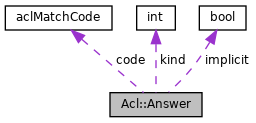#include <Acl.h>

Public Member Functions | |
| Answer (const aclMatchCode aCode, int aKind=0) | |
| Answer ()=default | |
| bool | operator== (const aclMatchCode aCode) const |
| bool | operator!= (const aclMatchCode aCode) const |
| bool | operator== (const Answer &allow) const |
| operator aclMatchCode () const | |
| bool | allowed () const |
| bool | denied () const |
| bool | conflicted () const |
| whether Squid is uncertain about the allowed() or denied() answer More... | |
| const SBuf & | lastCheckDescription () const |
| describes the ACL that was evaluated last while obtaining this answer (for debugging) More... | |
Public Attributes | |
| aclMatchCode | code = ACCESS_DUNNO |
| ACCESS_* code. More... | |
| int | kind = 0 |
| the matched custom access list verb (or zero) More... | |
| bool | implicit = false |
| whether we were computed by the "negate the last explicit action" rule More... | |
| std::optional< SBuf > | lastCheckedName |
| the name of the ACL (if any) that was evaluated last while obtaining this answer More... | |
Detailed Description
Constructor & Destructor Documentation
◆ Answer() [1/2]
|
inline |
◆ Answer() [2/2]
|
default |
Member Function Documentation
◆ allowed()
|
inline |
Whether an "allow" rule matched. If in doubt, use this popular method. Also use this method to treat exceptional ACCESS_DUNNO and ACCESS_AUTH_REQUIRED outcomes as if a "deny" rule matched. See also: denied().
Definition at line 82 of file Acl.h.
References ACCESS_ALLOWED, and code.
Referenced by accessLogLogTo(), aclFindNfMarkConfig(), aclMapTOS(), Acl::AllowOrDeny(), Client::blockCaching(), clientReplyContext::blockedHit(), ConnStateData::buildSslCertGenerationParams(), HttpReply::calcMaxBodySize(), Adaptation::Icap::Launcher::canRepeat(), Ssl::PeekingPeerConnector::checkForPeekAndSpliceDone(), ClientRequestContext::clientAccessCheckDone(), clientFollowXForwardedForCheck(), clientRedirectAccessCheckDone(), clientStoreIdAccessCheckDone(), conflicted(), FwdState::connectStart(), DelayId::DelayClient(), external_acl_entry_expired(), external_acl_grace_expired(), HttpStateData::finishingBrokenPost(), getOutgoingAddress(), HttpRequest::getRangeOffsetLimit(), HttpStateData::handle1xx(), Ftp::Server::handleUploadRequest(), htcpAccessAllowed(), httpHdrAdd(), httpHdrMangle(), httpsSslBumpAccessCheckDone(), httpsSslBumpStep2AccessCheckDone(), ClientHttpRequest::logRequest(), HttpRequest::manager(), external_acl::maybeCacheable(), Adaptation::AccessCheck::noteAnswer(), StoreClient::onCollapsingPath(), peerAllowedToUse(), Http::One::Server::processParsedRequest(), clientReplyContext::processReplyAccessResult(), ConnStateData::proxyProtocolValidateClient(), Ftp::Client::sendPassive(), ConnStateData::serveDelayedError(), Security::KeyLogger::shouldLog(), snmpDecodePacket(), ssl_verify_cb(), and ClientRequestContext::sslBumpAccessCheckDone().
◆ conflicted()
|
inline |
Definition at line 91 of file Acl.h.
References allowed(), and denied().
Referenced by clientFollowXForwardedForCheck().
◆ denied()
|
inline |
Whether a "deny" rule matched. Avoid this rarely used method. Use this method (only) to treat exceptional ACCESS_DUNNO and ACCESS_AUTH_REQUIRED outcomes as if an "allow" rule matched. See also: allowed().
Definition at line 88 of file Acl.h.
References ACCESS_DENIED, and code.
Referenced by ClientRequestContext::checkNoCacheDone(), conflicted(), FwdState::Start(), and tunnelStart().
◆ lastCheckDescription()
| const SBuf & Acl::Answer::lastCheckDescription | ( | ) | const |
Definition at line 123 of file Acl.cc.
References lastCheckedName.
Referenced by ClientRequestContext::clientAccessCheckDone(), and clientReplyContext::processReplyAccessResult().
◆ operator aclMatchCode()
|
inline |
◆ operator!=()
|
inline |
◆ operator==() [1/2]
|
inline |
◆ operator==() [2/2]
|
inline |
Member Data Documentation
◆ code
| aclMatchCode Acl::Answer::code = ACCESS_DUNNO |
Definition at line 96 of file Acl.h.
Referenced by allowed(), denied(), operator aclMatchCode(), and operator==().
◆ implicit
◆ kind
| int Acl::Answer::kind = 0 |
Definition at line 99 of file Acl.h.
Referenced by ACLChecklist::bannedAction(), Ssl::PeekingPeerConnector::checkForPeekAndSpliceDone(), dump_AuthSchemes(), dump_on_unsupported_protocol(), dump_sslproxy_ssl_bump(), httpsSslBumpAccessCheckDone(), httpsSslBumpStep2AccessCheckDone(), operator==(), and ClientRequestContext::sslBumpAccessCheckDone().
◆ lastCheckedName
| std::optional<SBuf> Acl::Answer::lastCheckedName |
Definition at line 105 of file Acl.h.
Referenced by Adaptation::Answer::blockedToChecklistAnswer(), ClientRequestContext::clientAccessCheckDone(), FindDenyInfoPage(), lastCheckDescription(), and ACLChecklist::markFinished().
The documentation for this class was generated from the following files:
Introduction
- About Squid
- Why Squid?
- Squid Developers
- How to Donate
- How to Help Out
- Getting Squid
- Squid Source Packages
- Squid Deployment Case-Studies
- Squid Software Foundation
Documentation
- Quick Setup
- Configuration:
- FAQ and Wiki
- Guide Books:
- Non-English
- More...
Support
- Security Advisories
- Bugzilla Database
- Mailing lists
- Contacting us
- Commercial services
- Project Sponsors
- Squid-based products
